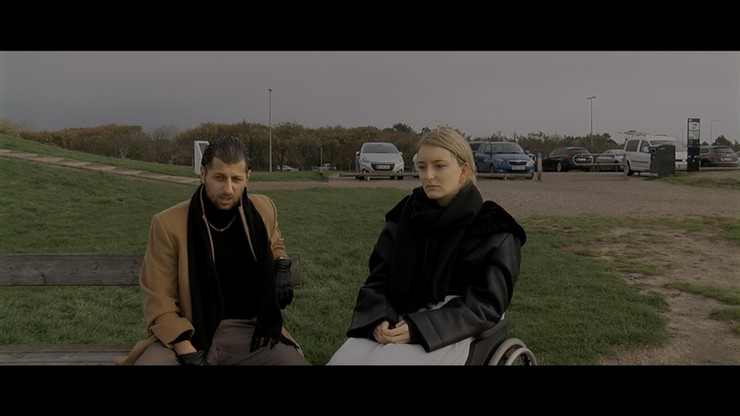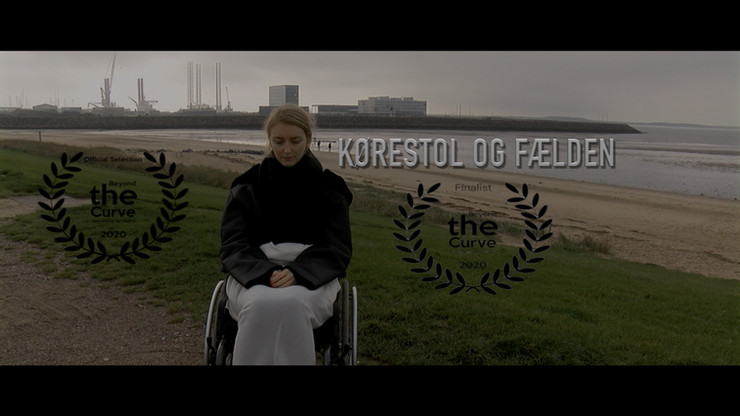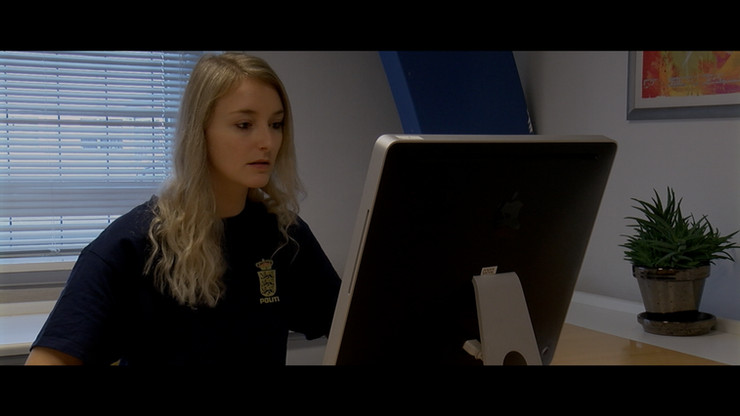The director, Bilal Hussain, already working at Tv-Glad Esjerg has been bestowed with the acknowledgement of course on Media. He works in several fields like reporting, camera and anchoring. He takes his interest in writing crime fiction. Two of them namely, “Detektivjagten” & “Eagle Unit ” have already been published. He has independently made Short films like “Drug Life” and “Jessica” and acted in “Tycho Brahe” along with two others. His works have been awarded thrice and nominated in different categories several times. Now he is busy in making the sequel of “Jessica”.
BCIFF: The movie “The Wheelchair and the Trap” draws attention towards how being the victim of somebody’s aggression can restrict the limit and possibilities of one’s life. How much do you agree to that? What do you think helps in recovering?
BILAL: I beg to differ. The character Michelle Pedersen played by Theresa Søvig Poulsen becomes a victim, because of the actions of the character Farhad Kazami played by Edwin Barandarou. My intentions are to tell the story from Michelle’s point of view. On the other hand, I want to tell the world, no matter how big your troubles are, you can survive and become the same person as you always have been.
BCIFF: Since you have addressed an imposed crime and a victim, does your movie only indicate the people who happen to be the victim of such circumstances? Or do you hint at the people who are disabled from the beginning?
BILAL: It’s both of these issues that I am addressing. I want to tell the dissable people from the beginning that life can be more tough but you can survive it.

BCIFF: Why do you choose to show a woman to be at the receiving end of the crime? How do you think a man would have done the role? Could it make any difference to the plot?
BILAL: I have honesetly not thought about the difference of sex of the main character. A male actor can easily play the lead role in a wheelchair. No, it wouldn’t make any difference because of the story-line in the film. A good actor / actress can play any role given to them if they really want to act and make a living out of it. A role like this is a “walk in a park”. It also depends on the director, how he wants them to portray the characters and how the movie will come out after the final editing. When I write any kind of a story I don’t think about the difference of sex, race or sexuality. We are all equal human beings.
BCIFF: Is there any hint of touching the age old convention of patriarchy to show how women are wronged by men years after years? Or is it just coincidental?
BILAL: When I was writing “The Wheelchair And The Trap” I didn’t think of the difference between men and women because the film is not about this issue. The film is more about being in a wheelchair because when you are in a wheelchair, then you’re not able to do the stuff you love. I have a few friends who use a wheelchair and they can’t for instance play soccer or drive a car. So, yes it is just coincidental.
BCIFF: Is your movie also about revealing the faulty administration and the judicial system of the nation by focusing on the corrupted cop?
BILAL: Yes. I wanted to show that there are corrupt cops everywhere in the world and they should not be part of the law. I wanted to be a policeman myself so when I see wrong things like for instance white cops killing black people or any other innocent human being, it makes me very sad but also very angry. Being a police man is a gift and they are supposed to protect the city rather than being thugs in uniforms.

BCIFF: How did you get the idea of breaking the victim twice? Was it necessary to hit the victim twice?
BILAL: Well, I have said this a lot in the past few interviews. The idea for this film just came to mind because I use a wheelchair myself when I travel for a long period of time. I have a rare genetic disease AAA Syndrome, which means I am not physically fit and I can’t walk for long periods of time. I have a few friends who sit in a wheelchair twenty four hours a day, so I thought of writing a fictional story on it. Writing the shootout scene was difficult, even more difficult was to film it. When I was writing the scene I had a lot of ideas and I knew in my head where the camera was going to film from. I only had one camera with different angles on the day. Just to make it very dramatic, then I thought it would give it a kick to have two – three bullet shots. Yes, you can say it was necessary.
BCIFF: Did you intend to literally show the trauma of the victim both physically and mentally? Is that the reason you chose to inflict physical inhibitions and psychological confinement upon her?
BILAL: Yes, I wanted to show both sides of the trauma. Because if the story was only about the physical element then it would have been boring. I wanted to show that the victim Michelle Pedersen played by Theresa Søvig Poulsen is a strong woman who doesn’t give up easily. That’s why the film has both sides of the trauma.
BCIFF: Is the threat at the end of the movie added to encourage the trapped people to come up with what they truly are and are capable of?
BILAL: I wanted to show, no matter how hard life is especially for dissable people, you can do anything. It’s just a matter of believing in yourself and not giving up.
BCIFF: You ended your story somewhat in an open way leaving us with multiple unanswered questions. This can really be all about audience response theory. Did you intend to leave it to the audiences’ interpretation or you have some other way of explaining it?
BILAL: The open ending is intentional. The audience can make their own theories right now and some films are better left open ended for the audience to judge. Then they’ll have something to think about after watching the film.

BCIFF: If you get another chance of re-filming it, would you like to bring any changes? If yes, then what are they?
BILAL: Yes, if I get a chance to reshoot, write, direct & produce “The Wheelchair And The Trap, then it will be a feature film. I would then do a better job in the shootout scene and have the characters more developed. I mean the characters will have more backstory to them.














